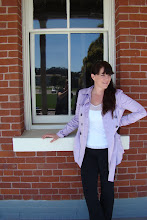A recent conversation I had with myself on Twitter got me thinking about those ultra-prolific writers. Well, two in particular: Patrick O’Brian and Walter Gibson. You know, guys who write like ONE BILLION words and one HUNDRED novels in over SEVENTY years of churning it out – mostly with good old fashioned pen and paper.
 |
| actually, Gibson used a typewriter |
At the same time, I stumbled – literally – across this article. (It was on my laptop, which was on the floor. My TOE found this
article.) It’s called “You Hate Your Writing? That’s a Good Sign!” In it, Jane Friedman argues that “you have to produce a lot of crap…before
you can produce anything good.” Therefore, if you hate your writing, you’re “probably”
on your way to good.
Risky concept. Because you could so easily be on your way to
more crap.
Part of me thinks: Why yes, it’s true. You have to write a
lot of crap. But strangely every molecule in my body is gearing up for a
revolt. Because then you have guys like O’Brian and Gibson who didn’t agonize for years about their "crap". They just dove right in. Shit, O’Brian got his first positive reviews for a book
he published at AGE 12.
SO I can’t help thinking that these guys just figured out
something essential, what other people take
years and years to get. What was it? How to tell a decent story? How to make
mistakes while you’re being watched?
It’s not to say they didn’t get better over time. I would
hope to hell they did, after 70 years, look back and say, yeah, I evolved.
But I think, too, that they found something good and stuck
with it, squeezing every last damn little thing out of it. And the things they
“found” were things they loved. Gibson was obsessed with the paranormal, and a
good half of his hundred books were about that. His big fictional contribution,
the Shadow, was deeply influenced by the occult. O’Brian loved the natural
world so much that limiting his characters to a single country was always going
to be tricky. They would travel the globe! On ships! For twenty books!
Hating your work sounds like a coy tool: a
self-policing mechanism to make you strive to be better all the time. To keep
you from getting arrogant and thus lame as hell.
But then you have these writers who seem to be dwarfed by their
passion for something. They don’t hate their work. It’s not about their work.
It’s about their sprawling, obsessive love for something that carries them
way beyond self-conscious agony. It reminds me of Virginia Woolf
saying of Jane Austen that her “mind had consumed all impediments.” And “for
that reason we do not know Jane Austen” - but we know the world she loved.
I think that means that Austen didn’t mope around hating her
work, she fell in love with it, and kind of lost herself in it. Not in the bad, domestic-violence way but in the I’m-not-the-center-of-the-universe kind of
way. Something else is happening here, not me.
Funny that this came out of a Twitter conversation I
had with myself, ye olde ultimate example of self-absorption. But there it is.




































